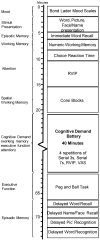Volatile Terpenes and Brain Function: Investigation of the Cognitive and Mood Effects of Mentha × Piperita L. Essential Oil with In Vitro Properties Relevant to Central Nervous System Function
- PMID: 30087294
- PMCID: PMC6116079
- DOI: 10.3390/nu10081029
Volatile Terpenes and Brain Function: Investigation of the Cognitive and Mood Effects of Mentha × Piperita L. Essential Oil with In Vitro Properties Relevant to Central Nervous System Function
Abstract
Extracts of several members of the monoterpene-rich Lamiaceae sub-family Nepetoideae, including those from the Salvia (sage), Melissa (Lemon balm) and Rosmarinus (rosemary) genera, evince cognitive and mood effects in humans that are potentially related to their effects on cholinergic and GABAergic neurotransmission. To date, despite promising in vitro properties, the cognitive and mood effects of the closely related Mentha spicata (spearmint) and Mentha piperita (peppermint) remain unexplored. This study therefore assessed the human cognitive/mood effects of the M. spicata/piperita essential oil with the most promising, brain-relevant in vitro properties according to pre-trial in vitro screening. Design: Organic spearmint and peppermint (Mentha spicata/piperita) essential oils were pre-screened for neurotransmitter receptor binding and acetylcholinesterase (AChE) inhibition. In a double-blind, placebo-controlled, balanced cross-over study, 24 participants (mean age 25.2 years) consumed single doses of encapsulated placebo and 50 µl and 100 µl of the most promising essential oil (peppermint with nicotinic/GABAA receptor binding and AChE inhibitory properties, that increased calcium influx in a CAD cell neuronal model). Psychological functioning was assessed with mood scales and a range of standardised, cognitively demanding tasks pre-dose and at 1, 3 and 6 h post-dose. Results: The highest (100 µL) dose of essential oil improved performance on the cognitively demanding Rapid Visual Information Processing task (RVIP) at 1 h and 3 h post-dose and both doses attenuated fatigue and improved performance of the Serial 3 s subtraction task at 3 h post-dose. Conclusion: Peppermint (Mentha piperita) essential oil with high levels of menthol/menthone and characteristic in vitro cholinergic inhibitory, calcium regulatory and GABAA/nicotinic receptor binding properties, beneficially modulated performance on demanding cognitive tasks and attenuated the increase in mental fatigue associated with extended cognitive task performance in healthy adults. Future investigations should consider investigating higher doses.
Keywords: Mentha; cognition; mint; terpenes.
Conflict of interest statement
The authors declare no conflict of interest.
Figures





Similar articles
-
Monoterpenoid extract of sage (Salvia lavandulaefolia) with cholinesterase inhibiting properties improves cognitive performance and mood in healthy adults.J Psychopharmacol. 2011 Aug;25(8):1088-100. doi: 10.1177/0269881110385594. Epub 2010 Oct 11. J Psychopharmacol. 2011. PMID: 20937617 Clinical Trial.
-
Yield, content, and composition of peppermint and spearmints as a function of harvesting time and drying.J Agric Food Chem. 2010 Nov 10;58(21):11400-7. doi: 10.1021/jf1022077. Epub 2010 Oct 13. J Agric Food Chem. 2010. PMID: 20942459
-
[Investigation of the in vitro effects of Melissa officinalis L., Mentha x piperita L. and Ocimum basilicum L. (Lamiaceae) essential oils on the cysts and trophozoites of Acanthamoeba castellani].Mikrobiyol Bul. 2016 Oct;50(4):569-579. doi: 10.5578/mb.30141. Mikrobiyol Bul. 2016. PMID: 28124962 Turkish.
-
Final report on the safety assessment of Mentha Piperita (Peppermint) Oil, Mentha Piperita (Peppermint) Leaf Extract, Mentha Piperita (Peppermint) Leaf, and Mentha Piperita (Peppermint) Leaf Water.Int J Toxicol. 2001;20 Suppl 3:61-73. Int J Toxicol. 2001. PMID: 11766133 Review.
-
A review of the bioactivity and potential health benefits of peppermint tea (Mentha piperita L.).Phytother Res. 2006 Aug;20(8):619-33. doi: 10.1002/ptr.1936. Phytother Res. 2006. PMID: 16767798 Review.
Cited by
-
Mentha piperita: Essential Oil and Extracts, Their Biological Activities, and Perspectives on the Development of New Medicinal and Cosmetic Products.Molecules. 2023 Nov 6;28(21):7444. doi: 10.3390/molecules28217444. Molecules. 2023. PMID: 37959863 Free PMC article. Review.
-
Use of Yoghurt Enhanced with Volatile Plant Oils Encapsulated in Sodium Alginate to Increase the Human Body's Immunity in the Present Fight Against Stress.Int J Environ Res Public Health. 2020 Oct 19;17(20):7588. doi: 10.3390/ijerph17207588. Int J Environ Res Public Health. 2020. PMID: 33086508 Free PMC article.
-
A Menthol-Enhanced "Cooling" Energy Gel Does Not Influence Laboratory Time Trial Performance in Trained Runners.Nutrients. 2023 Jul 29;15(15):3379. doi: 10.3390/nu15153379. Nutrients. 2023. PMID: 37571316 Free PMC article. Clinical Trial.
-
Rosmarinus officinalis and Mentha piperita Oils Supplementation Enhances Memory in a Rat Model of Scopolamine-Induced Alzheimer's Disease-like Condition.Nutrients. 2023 Mar 22;15(6):1547. doi: 10.3390/nu15061547. Nutrients. 2023. PMID: 36986277 Free PMC article.
-
Oral Health and Nutraceutical Agents.Int J Mol Sci. 2024 Sep 9;25(17):9733. doi: 10.3390/ijms25179733. Int J Mol Sci. 2024. PMID: 39273680 Free PMC article. Review.
References
-
- Abuhamdah S., Huang L., Elliott M.S., Howes M.J.R., Ballard C., Holmes C., Burns A., Perry E.K., Francis P.T., Lees G. Pharmacological profile of an essential oil derived from melissa officinalis with anti-agitation properties: Focus on ligand-gated channels. J. Pharm. Pharmacol. 2008;60:377–384. doi: 10.1211/jpp.60.3.0014. - DOI - PubMed
Publication types
MeSH terms
Substances
LinkOut - more resources
Full Text Sources
Other Literature Sources
Miscellaneous

